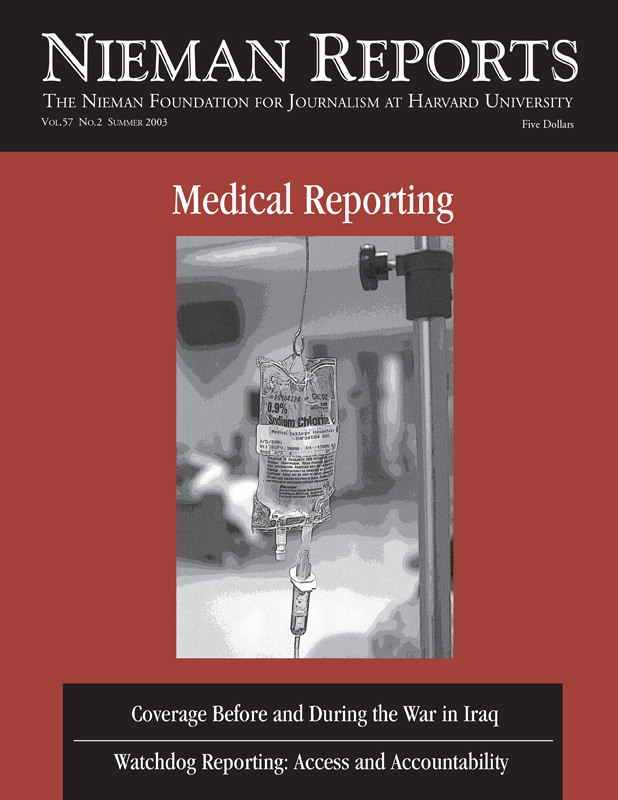On April 11, 2003, two days after the fall of Baghdad, Eason Jordan, CNN’s chief news executive, revealed in a New York Times op-ed, “The News We Kept to Ourselves,” that he had withheld information about how Saddam Hussein’s regime had intimidated and tortured Iraqis who had assisted CNN over the years. His revelations ushered in a debate among journalists about how CNN handled this situation and ways in which other news organizations should deal with similar difficult situations. An excerpt from Jordan’s op-ed and a memo he wrote to his staff four days later lead this section. Reaction to his words and actions follow.
“Over the last dozen years I made 13 trips to Baghdad to lobby the government to keep CNN’s Baghdad bureau open and to arrange interviews with Iraqi leaders. Each time I visited, I became more distressed by what I saw and heard—awful things that could not be reported because doing so would have jeopardized the lives of Iraqis, particularly those on our Baghdad staff.”
—Eason Jordan, “The News We Kept to Ourselves.”
“Knowing the personal stories I knew about the brutality of the regime, I had three options:
“Never repeat such horror stories.
“Tell the stories sooner and, as a result, see innocent people killed.
“Tell the stories after the downfall of the Saddam Hussein regime.
“I chose option three and could never imagine doing anything else.”
—Eason Jordan’s memo to CNN staff on April 15, 2003.
“To the Editor: Re ‘The News We Kept to Ourselves’ (Op-Ed, April 11):
“Eason Jordan of CNN ‘felt awful’ about keeping silent about the stories he knew of the horror of the Iraqi government. Yet he doesn’t seem to acknowledge the destruction his silence has done to the credibility of his news organization. About which other countries is the network keeping the truth ‘bottled up inside’ for fear of reprisals?
“At the very least, all of CNN’s news reports about sensitive regions should be prefaced by a disclaimer that its policy is not to broadcast information that might be offensive to those who issue credible threats against its reporters or staff.”
—Theodore Alper, Palo Alto, California, in a New York Times Letter to the Editor, published on April 13, 2003.
“I’m disturbed by [Jordan’s actions]. It really took the wind out of me. There were probably strategic business decisions about CNN’s relationship with the government, but this seems to me to be allowing the ethics of other endeavors to trump the ethics of journalism: to seek the truth and make it available.”
—Bill Kovach, former Nieman Foundation Curator and chairman of the Committee of Concerned Journalists, quoted in an April 14, 2003 USA Today article, “CNN Takes Heat for Action, Inaction,” by Peter Johnson.
“It may be that he bent too far [to obtain access], but I’ve got a feeling that everybody is bent. That goes with being in a terrible place.”
—Alex Jones, director of the Joan Shorenstein Center on the Press, Politics, and Public Policy, at Harvard’s John F. Kennedy School of Government, quoted on April 15, 2003 in media critic Dan Kennedy’s Media Log (www.dankennedy.net).
“Every news organization, and every reporter, makes difficult, morally ambiguous decisions when working in a totalitarian state. There are no hard and fast rules about where to draw the line between legitimate cooperation with authorities and outright collaboration. Some of the time it is right to let readers and viewers make intelligent inferences, as long as a sentence stating that ‘this reporter was operating under the rules of local censorship’ is inserted into an article or broadcast report.”
—The Washington Post, from an editorial, “Truth-Telling,” published on April 15, 2003.
“Reading Mr. Jordan now, you get the impression that CNN had no ethical option other than to soft-pedal. But there were alternatives. CNN could have abandoned Baghdad. Not only would they have stopped recycling lies, they could have focused more intently on obtaining the truth about Saddam. They could have diverted resources to Kurdistan and Jordan [the country], where recently arrived Iraqis could speak without fear of death. They could have exploited exile groups with underground contacts.”
—Franklin Foer, associate editor of The New Republic, writing in a Wall Street Journal op-ed, “CNN’s Access of Evil,” on April 14, 2003.
“The controversy has highlighted an uncomfortable reality. Covering totalitarian states forces a journalist to act in compromising ways. Anyone who has reported from such countries knows that it is one of the most challenging tasks a journalist faces, involving daily calculations over access, honesty, freedom of movement, and fear of reprisal. Some governments assume a foreign journalist is a spy. The way they treat you forces you to act like one. …
“It’s easy to say Mr. Jordan and CNN made the wrong choice. It certainly allows for a comforting moral clarity. And it may be that they stepped over a line in pandering to Iraqi officials. But I, for one, would be very slow in condemning them. Anyone who has faced the choices forced on journalists in those circumstances knows exactly what I mean.”
—Ethan Bonner, writing in The New York Times on April 21, 2003, “The Rules for Covering Brutal Dictatorships Aren’t Black and White.”



